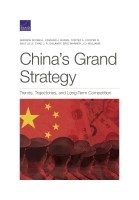The State Department announced Wednesday it is appointing a special coordinator to oversee relations with Tibet, The Hill reports. Robert Destro, who serves as assistant secretary of the Bureau of Democracy, Human Rights and Labor, will concurrently work as the U.S. special coordinator for Tibetan issues.
The appointment came as 54% of the U.S. public named China as the country posing the greatest challenge to the United States – with Russia a distant second at 22% – and there is strong support for advancing human rights in China among thought leaders and the U.S. public, according to a new CSIS survey (above).
 Although China seems unable to build values-based alliances rivaling those of the U.S., it is fielding transformational ideas attracting large participation, much as the U.S. did after World War II. Its Asian Infrastructure Investment Bank (AIIB) has drawn participation from many American allies, including half of NATO and many Asian partners, analyst John McLaughlin writes for Ozy.
Although China seems unable to build values-based alliances rivaling those of the U.S., it is fielding transformational ideas attracting large participation, much as the U.S. did after World War II. Its Asian Infrastructure Investment Bank (AIIB) has drawn participation from many American allies, including half of NATO and many Asian partners, analyst John McLaughlin writes for Ozy.
In the face of such realities, there is no perfect strategy for U.S. foreign policy — but there are strategies to avoid. In other words, we have to accept that it will be complicated and resist characterization by labels that echo the past, like “containment” or “Cold War” — terms inherited from a conflict with an adversary that disappeared. China will not disappear, he contends in China’s Course Between Conflict and Accommodation. But starting principles could include:
- A determination to compete aggressively on all measures of power and influence and to implement this with an American “whole-of-government” effort — that is, a strategy that marshals all parts of the U.S. government in a coordinated manner — economic, military, diplomatic and intelligence.
- Enhanced consultative mechanisms with China — military, diplomatic, economic, intelligence — to foster mutual comprehension and conflict management.
- U.S. cultivation and strengthening of U.S.-based alliances — aimed not at walling off China but at coordinating interaction with it. This is our most effective “force multiplier.”
- Focusing on aspects of U.S. defense modernization, acquisition, planning and deployment that give priority to enhancing deterrence — with the overriding aim of discouraging Chinese provocations that can lead to conflict.
See also Made in Germany, Co-opted by China, Emily de La Bruyère and Nathan Picarsic, Foundation for Defense of Democracies.







